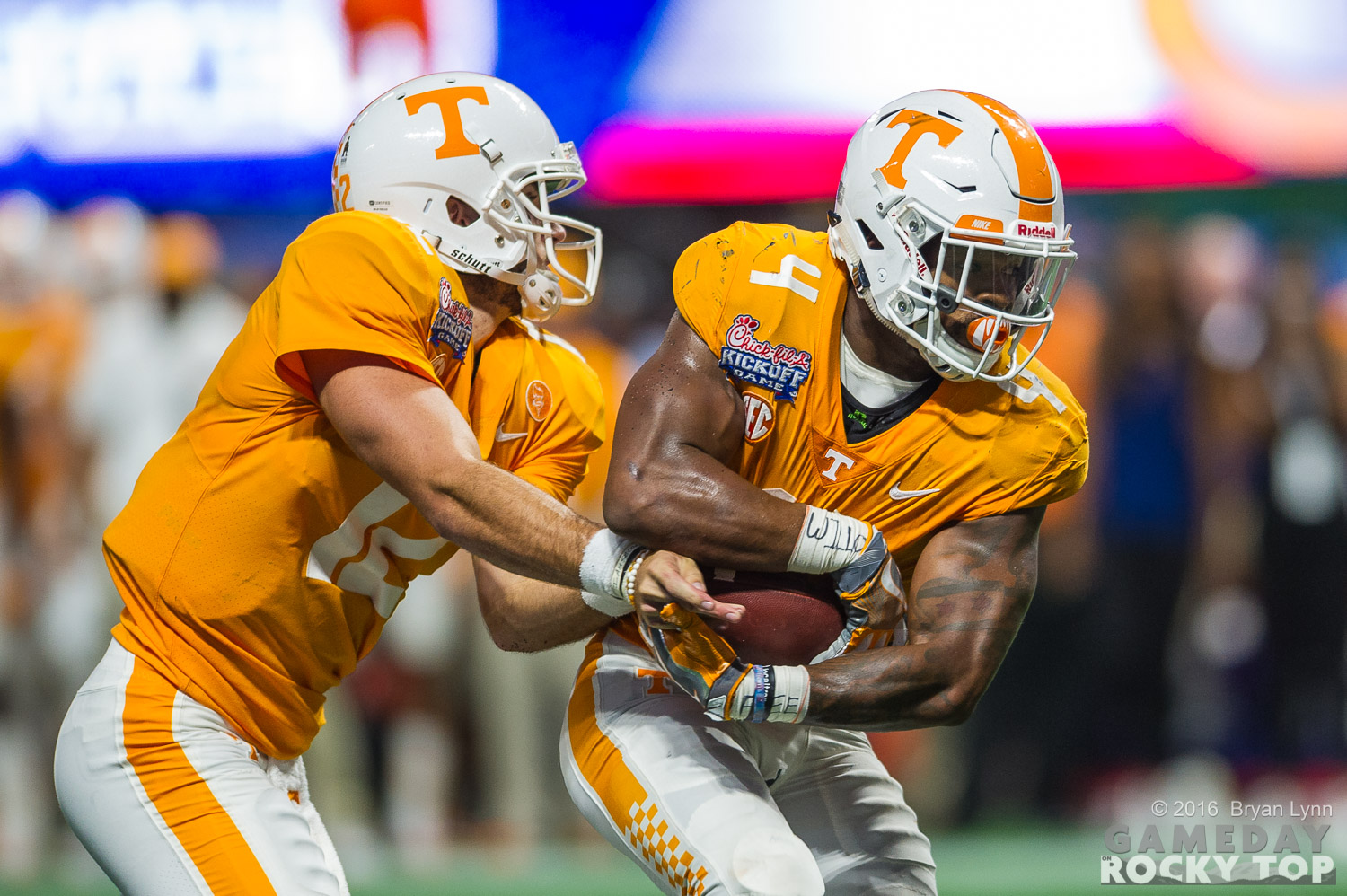There are plenty of numbers to support the growing narrative of Tennessee’s offense: the Vols again fell behind by two possessions, again rallied, and again should have won. Had they pulled it off in Gainesville it would have been the eighth time in the last 34 games Tennessee came back to win from down two possessions. That’s exciting, but the argument here is, “Is it necessary?”
In 2016 and the first three games of 2017, the Vols have been incredibly productive when they had the ball in the fourth quarter. And there are a plethora of statistics to back it up (the data comes from Sports Source Analytics):
Rushing Offense
- In 2016, Tennessee averaged 6.69 yards per carry in the fourth quarter with 11 touchdowns and 29 runs of 10+ yards. All three of those numbers were the best for any quarter of the game last fall. Through three games this year the Vols average 6.22 yards per carry in the fourth quarter, bested only by a 7.35 average in the second quarter.
- John Kelly in the fourth quarter this fall: 11 carries for 104 yards (9.45 ypc) with two touchdowns. He is one of only 16 players in college football to have run for 100+ yards in the fourth quarter this year, and is tied with nine other running backs atop the national leaderboard with four 10+ yard runs in the fourth quarter.
- Last year Josh Dobbs ran the ball 32 times for 324 yards (10.13 ypc) in the fourth quarter, seventh nationally in yards per carry.
These kind of numbers suggest an offense that wears down the defense all day and/or a team playing from behind against softer coverage. But most of Tennessee’s two-possession holes had already been erased by the fourth quarter last season (and Tennessee’s defense wasn’t good enough to make you feel safe about any lead). And the fourth quarter passing numbers are just as stout:
Passing Offense
- Last year Josh Dobbs was 49-of-73 (67.1%) for 739 yards (10.12 ypa) with nine touchdowns and three interceptions in the fourth quarter. His fourth quarter QB rating was fourth nationally.
- This year Quinten Dormady is 11-of-20 (55%) for 248 yards (12.4 ypa) with two touchdowns and an interception in the fourth quarter. His fourth quarter QB rating is currently 19th nationally.
- Dormady’s 248 fourth quarter passing yards are eighth nationally.
- John Kelly and Marquez Callaway in the fourth quarter: six catches for 187 yards and a touchdown.
- Josh Malone last year in the fourth quarter: 12 catches for 308 yards and four touchdowns. He was one of only nine players to finish the season with 300+ receiving yards in the fourth quarter.
Look at the yards per attempt per quarter over the last two years:
| Dobbs 2016 | Cmp | Att | Pct | Yds | YPA |
| 1Q | 58 | 96 | 60.4% | 704 | 7.33 |
| 2Q | 65 | 105 | 61.9% | 785 | 7.48 |
| 3Q | 51 | 80 | 63.8% | 703 | 8.79 |
| 4Q | 49 | 73 | 67.1% | 739 | 10.12 |
| Dormady 2017 | Cmp | Att | Pct | Yds | YPA |
| 1Q | 11 | 20 | 55.0% | 115 | 5.75 |
| 2Q | 17 | 30 | 56.7% | 143 | 4.77 |
| 3Q | 14 | 23 | 60.9% | 153 | 6.65 |
| 4Q | 11 | 20 | 55.0% | 248 | 12.40 |
Dormady doesn’t have the uptick in completion percentage Dobbs enjoyed in the fourth quarter, but the jump in yards per attempt is incredible.
All these numbers show the offense the Vols are running in the fourth quarter is incredibly potent. So what of the offense Tennessee runs in the other three quarters? What’s the difference?
I don’t have all the answers or the reasons why. As we noted yesterday, this has been an issue for Tennessee through three offensive coordinators and three starting quarterbacks under Butch Jones. The simplest explanation may be that playing from behind and in so many tight games has created have-to-have-it moments in the fourth quarter almost every week. And in those situations, Tennessee’s offense has largely excelled.
But the best way to win close games continues to be not to play them. If the team that shows up in the fourth quarter somehow manifests itself earlier and/or throughout the game – in some combination of philosophy, play-calling, and execution – the Vols would not find themselves in position to get beat by a miraculous play.
We saw Butch Jones make an adjustment in philosophy to get to this point: in 2015 the Vols were racing to early leads, then letting off the gas. That kind of loss hasn’t happened since the Arkansas game that year. But now the Vols are saving too much gas for the home stretch. A better chance of success, for the Vols and their head coach, is to treat every play like it’s the fourth quarter.

